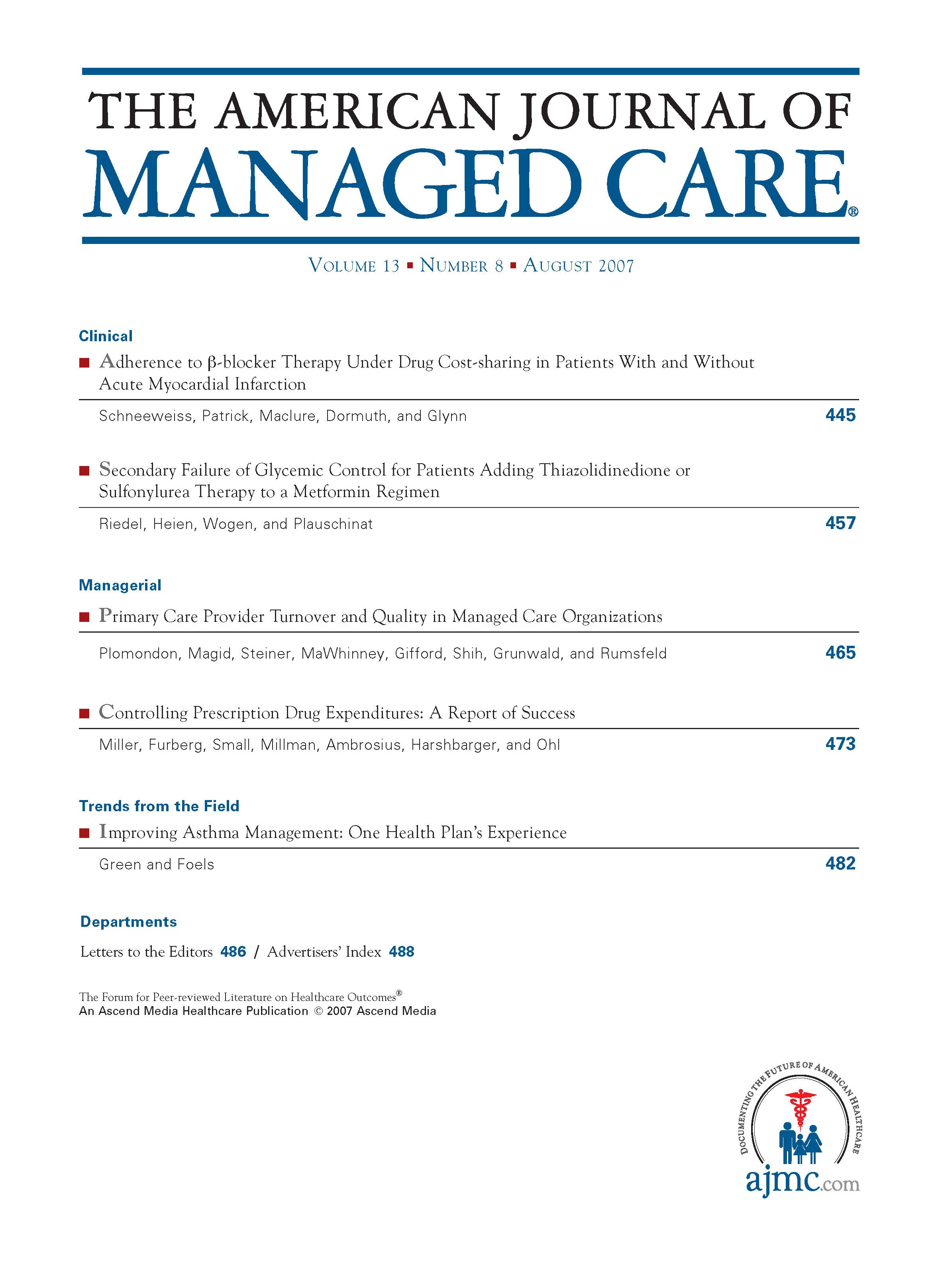- Center on Health Equity & Access
- Clinical
- Health Care Cost
- Health Care Delivery
- Insurance
- Policy
- Technology
- Value-Based Care
Who Should Receive Optimal Diabetes Care?
TO THE EDITORS:
Pogach et al1 recommend against the use of glycosylated hemoglobin (A1C) of less than 7% as a diabetes quality measure. Hayward's accompanying editorial labels all-or-none treatment targets bad performance measures.2 However, Minnesota's multiyear real-world experience reporting Optimal Diabetes Care, a measure that incorporates multiple all-or-none treatment thresholds, differs from these opinions.
HealthPartners, a large Minnesota health plan, publicly reports comparative provider group performance on a composite All-or-None Optimal Diabetes Care measure.3 In addition to A1C of less than 7.0%, the measure also requires a low-density
Employer Data and Information Set specifications.
Minnesota Community Measurement reports the same measure using all payer data at www.mnhealthcare.org, and Fairview University Clinics recently began reporting individual clinic Optimal Diabetes Care rates at http://www.fairview.org/patient_safety/. More than 40% of patients with diabetes cared for by Fairview's highest
President and CEO
Peoria, Illinois
George J. Isham, MD
HealthPartners
VA New Jersey Health Care System
David Aron, MDCleveland VA Medical Center
Donald R. Miller, ScDBedford VA Medical Center
Address correspondence to: Gail M. Amundson, MD, Quality Quest for Health, 100 NE Adams St, LX-7170, Peoria, IL 61629-7170. E-mail: amundson_gail@cat.com.
Address correspondence to: Leonard M. Pogach, MD, VA New Jersey Health Care System, East Orange VAMC, Rm 9-160 (111), 385 Tremont Ave, East Orange, NJ 07018. E-mail: leonard.pogach@med.va.gov.
Author Disclosure: Dr Miller reports receiving grants from GlaxoSmithKline, Merck, and Sanofi-Aventis. The remaining authors (GMA, GJI, LMP, DA) report no relationship or financial interest with any entity that would pose a conflict of interest with the subject matter discussed in this manuscript.
Author Information: Concept and design (GJI, LMP, DA, DRM); acquisition of data (DRM, LMP); drafting of the manuscript (GJI, LMP, DA, DRM); analysis and interpretation of data (LMP); critical revision of manuscript for important intellectual content (LMP, DA, DRM); administrative, technical, or logical support (LMP); supervision (GJI, LMP).
1. Pogach LM, Tiwari A, Maney M, Rajan M, Miller DR, Aron D. Should mitigating comorbidities be considered in assessing healthcare plan performance in achieving optimal glycemic control? Am J Manag Care. 2007;13:133-140.
3. Amundson GM, Gentilli S. HealthPartners Clinical Indicators Report. 14th ed. Bloomington, Minn: HealthPartners, Inc; 2006.
5. The Dartmouth Atlas of Health Care. Available at: www.dartmouthatlas.org. Accessed May 14, 2007.6. UnitedHealth Group State Health Rankings. Available at: http://www.unitedhealthfoundation.org/ahr2006/Findings.html#Findings. Accessed
7. O’Connor PJ, Desai J, Solberg LI, et al. Randomized trial of quality improvement intervention to improve diabetes care in primary care settings. Diabetes Care. 2005;28:1890-1897.
9. Thompson W,Wang H, Xiem, et al. Assessing quality of diabetes care by measuring longitudinal changes in hemoglobin A1C in the Veterans Health Administration. Health Serv Res. 2005;40:1818-1835.
11. Pogach L, Engelgau M, Aron D. Measuring progress towards achieving hemoglobin A1c goals: pass/fail or partial credit. JAMA. 2007;297:520-523.

Quality of Life: The Pending Outcome in Idiopathic Pulmonary Fibrosis
February 6th 2026Because evidence gaps in idiopathic pulmonary fibrosis research hinder demonstration of antifibrotic therapies’ impact on patient quality of life (QOL), integrating validated health-related QOL measures into trials is urgently needed.
Read More
Building Trust: Public Priorities for Health Care AI Labeling
January 27th 2026A Michigan-based deliberative study found strong public support for patient-informed artificial intelligence (AI) labeling in health care, emphasizing transparency, privacy, equity, and safety to build trust.
Read More
Ambient AI Tool Adoption in US Hospitals and Associated Factors
January 27th 2026Nearly two-thirds of hospitals using Epic have adopted ambient artificial intelligence (AI), with higher uptake among larger, not-for-profit hospitals and those with higher workload and stronger financial performance.
Read More
Motivating and Enabling Factors Supporting Targeted Improvements to Hospital-SNF Transitions
January 26th 2026Skilled nursing facilities (SNFs) with a high volume of referred patients with Alzheimer disease and related dementias may work harder to manage care transitions with less availability of resources that enable high-quality handoffs.
Read More

